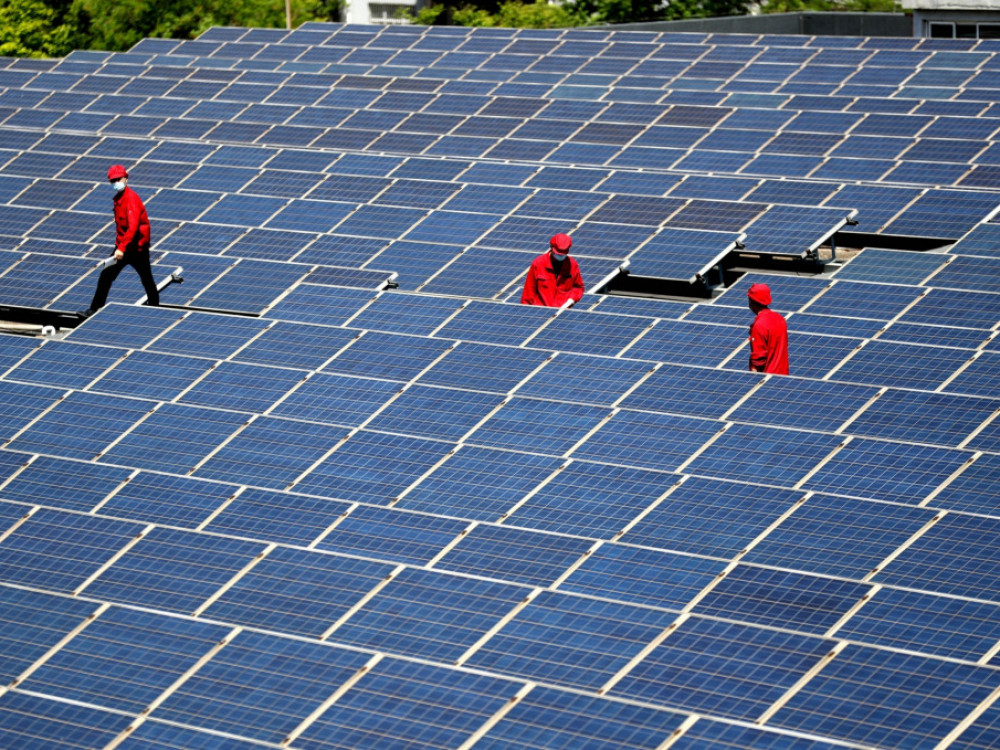SARAJEVO – Hundreds of constructed solar power plants in the Federation of Bosnia and Herzegovina, within the area covered by Elektroprivreda BiH, are awaiting connection to the electricity distribution grid. As a result, a significant number of investors who have followed the procedures are facing substantial losses on multiple fronts.

Simultaneously, Bosnia and Herzegovina is missing the opportunity to meet the requirements of the European Energy Community for increased electricity production from renewable sources, as well as to access funds from European funds for projects in this field.
Great Losses
“At this moment, around a hundred constructed power plants in the Tešanj region alone are awaiting connection. At the same time, a larger number of investors have received notices from Elektroprivreda BiH (Bosnia and Herzegovina Power Utility) that the process of issuing preliminary energy approvals has been suspended until further notice, which is the beginning of the process. Some of us, who completed construction earlier, have waited for over a year to be connected to the grid. And those are significant losses. However, even greater losses are suffered by entrepreneurs who are building power plants for their own needs in order to export their products without paying the CO2 tax, which is not an insignificant expens”, explains Muharem Saračević, President of the Assembly of the Green Energy Association, which brings together owners of solar power plants in the Zenica-Doboj Canton.
He emphasizes that some investors built facilities without prior approval and in locations not connected to the electricity distribution network, and some even built transformer substations themselves.
“EP BiH has now set a deadline of 1,000 days, although the law provides for a much shorter one. They have created this long deadline to avoid pressure from investors. If everyone who embarked on investments were connected, Tešanj could become entirely energy-independent”, says Saračević.
Grid Congestion
Solar energy production is highly desirable as it’s environmentally friendly, requires moderate investment, offers a return on investment within 5-6 years, and solar panels have a lifespan of up to 25 years.
New laws will allow residents of the Federation of Bosnia and Herzegovina to install solar panels on their homes and buildings, generating electricity for personal use and sending excess energy back to the grid. Currently, there are over 750 solar power plants of varying capacities operational in the FBiH, and there is a slow buildup of congestion in the existing electricity distribution network.
“Currently, EP BiH no longer grants these preliminary approvals. We assume this is because the network is congested. The power utilities, including Elektroprenos BiH, lack a strategy and don’t know where to reinforce the network and build transformer substations. They didn’t think about transition. Now, for example, in Tešanj, we don’t have space for a single connection. With the new laws, there’s a fear that requests submitted under the old law will be processed under the new law, which among other things requires land conversion. And that’s a very expensive and time-consuming process “, explains Saračević, emphasizing that laws and procedures in the FBiH vary from one canton to another.
Unanswered Questions
Even after more than ten days of waiting and multiple resendings of inquiries, EP BiH (Bosnia and Herzegovina Power Utility) has not responded to questions such as how many solar power plants are currently supplying electricity to EP BiH and what quantity of electric energy they receive from them; how many completed solar plants are awaiting grid connection, and how many connection requests are currently pending; the average waiting time and potential extended waiting times; the potential production of those plants in the queue; the reasons behind the wait for grid connection; who is responsible for the development of that part of the electricity distribution network; whether there is an estimate of the necessary investment to bring the network to a state where it can accommodate all the electricity from buildings with construction permits, and the time required for such activities.
In Elektroprivreda HZ HB (Electric Utility Company of Herzeg-Bosnia), they claim not to have any solar power plants waiting to be connected to the grid.
“We had a problem with power plants from the Hodovo industrial zone, but we built a transformer station with our own funds, even though there was a dilemma of whether we or Elektroprenos BiH should do it. But we resolved that issue ourselves” explained EP HZ HB.
EP BiH Rejects Requests
Designers and builders confirm that “there are constructed and unconnected power plants of various capacities, some buildings have waited for a year for grid connection, and at the time of writing this text, there are structures with usage permits that are not connected because EP BiH has not completed its part of the work”.
“A much bigger problem is preliminary energy approvals, which are a prerequisite for further documentation development. EP BiH rejects requests in various ways. First, they request a report that only they can create, as they have a monopoly on data and are unwilling to open their databases for others to work on it. The cost can go up to 3,000 KM (Bosnian Convertible Mark), and then, after the investor pays for the report, EP BiH rejects it, claiming that the investor’s facility at the desired location cannot be connected to the grid, without offering a solution. The second problem is much bigger – it involves the suspension of the process of issuing electro-energetic approvals, often citing Elektroprenos BiH (Bosnia and Herzegovina Electricity Transmission Company), which usually promptly completes all requests submitted by EP BiH. There are hundreds of such cases, leaving investors uncertain as they bought land, initiated part of the project documentation, started their investments, and are now halted. The third, perhaps the biggest problem, is when reports show that a facility can be connected, yet EP BiH still issues a decision stating otherwise. The Regulatory Commission in the FBiH (Federation of Bosnia and Herzegovina) or FERK (State Electricity Regulatory Commission) has recently annulled a significant number of such EP BiH decisions, restarting the process from scratch “,says Edhem Bičakčić, founder of the design firm Bičakčić d.o.o. and a former director of EP BiH.
What Are Electric Utilities Afraid Of?
He believes that both electric utilities in Bosnia and Herzegovina are doing everything to prevent the connection of solar power plants to the grid, even when there is no reason for it.
“They view investors as competition and are not happy about the construction of solar power plants, and now they are also afraid of prosumers/producers who are coming with new laws”, he explains.
Some owners of previous electro-energetic approvals, who, according to sources, neither have land for building facilities nor an interest in construction, sell these approvals at significantly higher prices. New investors cannot obtain Pre-Energetic Approvals (PES) because registration of connections based on issued PESs is recorded in the EP BiH database.
“I know that there are stories about this, but I cannot claim anything. There is an order of processing requests, the software in EP BiH works in that way, and they should process requests in the order of submission. It is not excluded that there are investors who have obtained PESs but, for various reasons, cannot continue their activities and might then sell the company. However, I am not aware if they can resell PESs or their place on the waiting list”, estimates Bičakčić.
Everything is Complicated
And Amer Jerlagić, owner of the company SHPP d.o.o. Sarajevo and also a former director of EP BiH, confirms that a large number of constructed facilities are waiting for connection to the grid
“Procedures for industrial halls and power plants for self-consumption with power aligned to the needs of the facility are completed quite quickly, but everything else is very complicated because, in the processes for rooftop and ground-mounted solar power plants for commercial production, the power companies issue new regulations every day to make life harder for investors. When the construction of solar power plants first started, investors didn’t need anything, but now they are required to have building and urban planning permits. Everything is very complicated, and all the talk about simplifying procedures for self-consumption production has fallen apart”, says Jerlagić.
Lack of Reaction
An expert in the electricity distribution network, employed at FERK (Regulatory Commission for Energy in the Federation of Bosnia and Herzegovina), Senad Aganović, confirms that no one in the FBiH has accurate data on how many completed facilities are waiting for grid connection.
” The distribution network is undergoing transformation, as it has been one-way so far, only delivering electricity to consumers. Now it needs to adapt to two-way electricity exchange, as those who produce for their own consumption should have the possibility to feed surplus electricity back to the power companies. Additionally, there are quantities that the network cannot handle. This transition required a reaction from all responsible parties in the system, which was not done on time due to objective and subjective reasons”, says Aganović.
He emphasizes that some investors built facilities in locations that are not connected to the distribution network, and some even built transformer stations to be able to connect to the distribution network, creating problems for the system operator.
“A subjective problem is that many of them start building before they get approval for connection, and when the construction is completed, EP BiH tells them that there is no place to connect them. An objective problem is weak connection points in the network that are not adapted to new conditions. Personally, I believe that the distributor should have more frequent discussions with the electricity transmission company and consider the possibilities for expanding connection points”, says Aganović.
Last-Minute Studying Campaigners
He does not believe that those responsible in the electricity sector lack an understanding of companies in need of electricity from clean sources.
“We in Bosnia and Herzegovina are lagging behind in solving all problems, behaving like campaigners who study the day before the exam and hope that the exam question they know will come up” says Aganović.
In the professional electricity community in Bosnia and Herzegovina, there are experts who believe that it is “too late for any kind of situation improvement and that electricity production from the sun is becoming a bubble that will soon burst. They also point out that public enterprises and state institutions are not doing their job at the necessary speed, nor do they understand how dire the situation is for public electricity distribution companies.
– The moment when men in cafes talk more about solar energy production than about football, something is not right – says one of the experts.
Burying Heads in the Sand
Jerlagić believes that everyone in the electricity sector has been irresponsible towards their obligations.
“Everyone has buried their heads in the sand like ostriches for the past 10 years and delayed the construction of new transmission lines, thinking that this momentum would never come. Especially problematic is the situation towards western Bosnia, around Grahovo, Kupres, Livno, Duvno… that should have been strategically planned, building connections towards Croatia, especially on the kilovolt network. Distributors claim they couldn’t work, but they could have engaged third parties to do so. People have been waiting for a year to connect to the network for their own facilities because someone was undermining tenders and the like. It’s unclear why someone didn’t pull EP BiH out of the tendering process “, says Jerlagić.
And he emphasizes that a large amount of solar power is waiting to be integrated into the grid.
Bičakčić believes that there is still time to improve things, primarily through the construction of new transmission lines, which should be done by Elektroprenos BiH.
“Large private power plants are rapidly being built in Bosnia and Herzegovina, two of 220 kilovolts and soon one of 400 kilovolts, which was previously unthinkable, and many of 100 and 200 kilovolts have already been built, with a large number in the construction phase. Elektroprenos BiH behaves correctly and prepares the documentation and constructs. However, in Herzegovina, for example, there is no longer space for network access and they should start building new transmission lines and implement the construction plans they have. But they are not doing that. The investment cycle could easily be initiated by the two entity prime ministers very quickly. At the same time, power companies must issue electricity connection permits, and build development capacities so that facilities can be connected, especially in rural areas”, says Bićakčić.
He adds that power companies do not have the right to suspend the issuance of connection permits but must process and complete them within 300 days.
“There are certain locations where there is no space for connection, but that needs to be explained to the investor or a transmission line needs to be provided. They have now shifted the cost of building transmission lines onto the investors, but that is also challenging”, says Bićakčić.
Fulfilling Obligations
He believes it’s a good moment for Bosnia and Herzegovina to capitalize on the momentum of private investors and move closer to fulfilling the EEZ’s demands for more electricity from renewable or clean sources, while also enabling exporters from Bosnia and Herzegovina to use clean energy for production.
He thinks this is a good time to access funds from the EEZ funds and we should seize this opportunity “because they won’t repeat indefinitely”.
Aganović also believes that Bosnia and Herzegovina could access funds from the EEZ funds, but few in Bosnia and Herzegovina demonstrate that they know what we need and what we can do in which period
“If there is a mitigating factor – other countries have the same problems, especially with the demands of prosumers, which will now appear here as well and which are very necessary both for maintaining the system and for protecting social categories of the population”, he concludes. interview.ba



3 komentara
Molimo Vas da pročitate sledeća pravila prije komentarisanja:
Komentari koji sadrže uvrede, nepristojan govor, prijetnje, rasističke ili šovinističke poruke neće biti objavljeni. Nije dozvoljeno lažno predstavljanje, ostavljanje lažnih podataka u poljima za slanje komentara. Molimo Vas da se u pisanju komentara pridržavate pravopisnih pravila. Komentare pisane isključivo velikim slovima nećemo objavljivati. Zadržavamo pravo izbora i skraćivanja komentara koji će biti objavljeni. Mišljenja sadržana u komentarima ne predstavljaju stavove poslovnog portala CAPITAL.ba. Komentare koji se odnose na uređivačku politiku možete poslati na adresu info@capital.ba
U Banjaluci imate mogucnost da izbjegnete svu papirologiju i da firma koja vam postavlja solarnu elektranu uz vasu punomoc
dovede kompletan projekat u zavrsnu fazu i spoji vas na mrezu.
Ali ako mislite da je to kraj vasih muka onda trebate znati da ne zivite u EU vec u BiH.
U Sloveniji ako postavite solarne panele i toplotnu pumpu na ulog od 25000 od drzave Slovenije dobijete jos toliko ucesca,
U BiH ukoliko ulozite novac i instalirate to isto dobicete odgovor da bez obzira sto ste spojeni na mrezu i sto predajete kw koje proizvodite u mrezu ,iste necete moci da prebijete tj.da recimo po noci kada nema sunca i ne pravite energiju potrosite te kw koje ste proizveli po danu jer Elektroprivreda po nalogu UIO ne smije da prebija kw vec se mora platiti pdv i na kw koji ste vi poslali u mrezu ,a i na kw koji vam je Elektroprivreda vratila .Tako da i dalje placate racun bez da ste u mogucnosti da potrosite kw koje ste poslali u mrezu.Javna je tajna da je bivsi ministar Lukac( koji je postavio elektranu na krov svoje kuce) tuzio Elektroprivredu zbog toga.
Obzirom da sa Elektroprivredom prebijate struju 0.07 km na godisnju proizvodnju od recimo 10.000 kw x 0.07 =700 km
UIO zeli da se “opari ” sa 119 km poreza i ne dozvoljava da se ti kilovati “prebiju”.
Da me neko ne bi pogresno razumio ,nije tako mala “zarada” na elektrani jer od tih 10.000 kw potrosicete direktno iz invertera 5000 kw a onda vas taj kw nece kostati 0.15 km koliko bi inace kostao sa mrezarinom i porezom pa je zarada u stvari 750 km
plus 5000 x 0.07 ili ukupno 1100 km godisnje i tada dolazite do matematike da je povrat investicije oko 18 godina a vijek trajanja panela je oko 30 god.Ukoliko UIO ne odustane od te “bezobrazne” ideje jedini njihov uspjeh ce biti taj sto ce vlasnici elektrana platiti pdv na baterije od 10 kw i tako svesti prebijanje na sto manji procenat a buduce investitore u solarne elektrane odvratiti od ulaganja.
P.S
Nase predstavnike sve vise dozivljavam kao zlog susjeda a ne kao nekoga ko treba da se trudi da nam svima bude bolje.
Ukoliko idete kroz park i vidite stazicu koju je utabalo hiljadu ljudi koji su tu prosli i prva misao koja vam padne na pamet bude da treba postaviti tablu “zabranjen prolaz” i naplacivati kazne (umjesto da se tu treba napraviti staza jer je ocigledno da bas tu treba da bude) molim vas ,ucinite uslugu svojoj majci,bratu,komsiji ,prijatelju i nemojte se kandidovati za nekog narodnog poslanika jer ocigledno nemate sluha i nije to za vas.
UIO ne dizvoljava prebijanja obicnim gradjanima ali prebijanja izmedju elektroprivreda su milionska ali se ne prikazuju. Nego samo ona razlika
Ukupna kolicina koju isporuce jedna drugoj uopste se ne obracunava pdv .
Hvala ti za ovaj komentar!